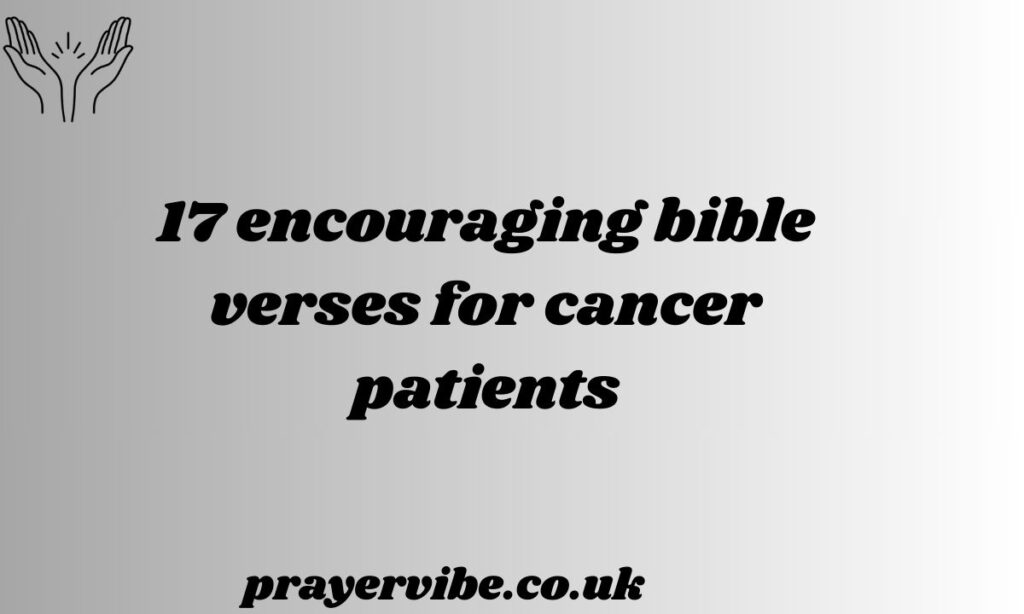A cancer diagnosis can shake the very foundations of our lives, bringing with it a whirlwind of emotions, questions, and fears. In these moments of uncertainty, many find solace and strength in the timeless wisdom of Scripture.
The Bible, a beacon of hope for countless generations, offers words of comfort and encouragement that speak directly to the heart of those facing life’s most challenging trials. 🙏
For cancer patients, their families, and caregivers, certain Bible verses can serve as powerful reminders of God’s unfailing love, His constant presence, and His promise of hope even in the darkest times. These verses are not mere words on a page; they are lifelines of faith, anchoring us to the unshakeable truth of God’s character and His promises. 🌟
🙏 Divine Prayer Generator
Select a prayer category to begin
The Importance of Faith During Cancer Treatment 🕊️
When facing a cancer diagnosis, it’s natural to focus on physical treatments and medical interventions. However, addressing spiritual well-being is equally crucial for holistic healing and coping with the challenges ahead. Faith can play a vital role in this process, offering comfort, strength, and a sense of purpose during difficult times.
The mind-body-spirit connection is well-documented in medical literature. Studies have shown that spiritual well-being can positively impact overall health outcomes, including better quality of life, reduced stress and anxiety, and even improved physical symptoms. For cancer patients, nurturing their faith can provide a powerful complement to medical treatments.
Here’s how faith, particularly through engaging with encouraging Bible verses, can benefit cancer patients:
Emotional Support:
Faith offers a source of comfort and peace, helping to manage the emotional turmoil that often accompanies a cancer diagnosis. ❤️
Stress Reduction:
Regular prayer, meditation on Scripture, and trust in God’s promises can help reduce stress levels, which is beneficial for overall health. 😌
Hope and Perspective:
Biblical teachings remind us of God’s love and the bigger picture beyond our current circumstances, fostering hope and resilience. 🌈
Community:
Faith often connects individuals to supportive communities, reducing feelings of isolation during the cancer journey. 👥
Coping Mechanism:
Turning to Scripture provides a positive coping strategy, helping patients navigate the ups and downs of treatment. 🛡️
Sense of Purpose:
Faith can help patients find meaning in their experience, sometimes even discovering a renewed sense of purpose through their cancer journey. 🔍
Inner Strength:
The encouragement found in Bible verses can bolster inner strength, helping patients face treatments and uncertainty with courage. 💪
By turning to encouraging Bible verses, cancer patients can tap into a wellspring of spiritual strength. These verses serve as reminders of God’s presence, His love, and His promises – powerful truths that can sustain us through the most challenging times. 📖
17 Encouraging Bible Verses for Cancer Patients

1. Psalm 46:1-2 – God as our refuge and strength 🏰
“God is our refuge and strength, an ever-present help in trouble. Therefore we will not fear, though the earth give way and the mountains fall into the heart of the sea.” – Psalm 46:1-2 (NIV)
This powerful verse from Psalms offers immense comfort to those facing the storms of cancer. Let’s break it down and see how it applies to the cancer journey:
- “God is our refuge”: A refuge is a safe place, a shelter from danger. For cancer patients, God offers Himself as a spiritual sanctuary where we can find peace amidst the turmoil of diagnosis, treatment, and recovery. When fear and uncertainty threaten to overwhelm, we can retreat into the safety of God’s presence.
- “and strength”: Cancer can be physically, emotionally, and spiritually draining. This verse reminds us that God is not only our protection but also our source of strength. When we feel weak or unable to face another day, we can draw upon God’s infinite strength to sustain us.
- “an ever-present help in trouble”: The phrase “ever-present” is crucial here. It means God is not distant or unreachable but always right there with us. In the lonely hours of night, during challenging treatments, or in moments of fear, God is present and ready to help.
- “Therefore we will not fear”: This is not a command but a natural result of trusting in God’s refuge and strength. As we lean on God, our fear diminishes in the light of His power and love.
- “though the earth give way and the mountains fall into the heart of the sea”: This vivid imagery represents extreme circumstances – like receiving a cancer diagnosis or facing difficult treatments. Even when our world feels like it’s falling apart, God remains our constant source of security and strength.
Applying this verse:
- Memorize this verse and recite it when anxiety strikes.
- Visualize God as your refuge, a safe place you can retreat to in prayer.
- When feeling weak, pray for God’s strength to fill you.
- Remember God’s ever-present nature; talk to Him throughout your day.
- Use this verse to counter fearful thoughts, replacing them with trust in God.
This psalm reminds us that no matter how dire our circumstances may seem, God is greater. He offers us refuge, strength, and His constant presence. As you face each day of your cancer journey, let this verse be a source of comfort and courage, knowing that the God of the universe is your personal refuge and strength.
2. Isaiah 41:10 – God’s presence and support 🤲
“So do not fear, for I am with you; do not be dismayed, for I am your God. I will strengthen you and help you; I will uphold you with my righteous right hand.” – Isaiah 41:10 (NIV)
This verse from Isaiah is a powerful declaration of God’s commitment to His people, offering particular comfort to those facing the challenges of cancer. Let’s explore its rich meaning:
- “So do not fear, for I am with you”: Fear is a common companion on the cancer journey, but God directly addresses this emotion. He doesn’t just tell us not to fear; He gives us a reason – His presence. The assurance that God is with us can be a source of immense comfort during uncertain times.
- “do not be dismayed, for I am your God”: To be dismayed is to be distressed and filled with anxiety. God reminds us of our relationship with Him – He is our God. This personal connection assures us that the all-powerful Creator is on our side.
- “I will strengthen you and help you”: Cancer treatment can be exhausting, both physically and emotionally. God promises not only to be present but to actively strengthen and help us. This divine support can give us the endurance to face each day’s challenges.
- “I will uphold you with my righteous right hand”: The image of God’s “righteous right hand” represents His power and authority. To be upheld by God means He’s supporting us, keeping us from falling. Even when we feel we can’t go on, God is there, holding us up.
Applying this verse to the cancer journey:
- Start each day by reminding yourself of God’s presence. You’re not facing cancer alone.
- When fear creeps in, counter it with the truth of this verse. Speak it out loud if necessary.
- In moments of weakness, ask God for the strength He promises.
- Visualize God’s hand supporting you through difficult treatments or long nights.
- Share this verse with your caregivers and family, allowing them to find strength in it too.
For cancer patients, this verse serves as a powerful reminder that God is not a distant observer but an active participant in our struggles. He promises His presence, strength, help, and support. As you navigate the ups and downs of your cancer journey, let these words sink deep into your heart. God, the Creator of the universe, is personally committed to upholding you through this challenge.
3. Jeremiah 29:11 – God’s plans for hope and a future 🌱
“‘For I know the plans I have for you,’ declares the Lord, ‘plans to prosper you and not to harm you, plans to give you hope and a future.'” – Jeremiah 29:11 (NIV)
This beloved verse from Jeremiah offers a powerful message of hope and reassurance, particularly meaningful for those navigating the uncertain waters of a cancer diagnosis. Let’s unpack its significance:
- “For I know the plans I have for you”: God asserts His intimate knowledge of our lives and His active involvement in planning our future. This can be incredibly comforting when cancer makes the future seem unclear or frightening. It reminds us that despite the uncertainty we feel, God sees the bigger picture.
- “declares the Lord”: This phrase emphasizes the authority behind the statement. These aren’t just comforting words; they’re a declaration from the Creator of the universe.
- “plans to prosper you and not to harm you”: The word “prosper” here doesn’t necessarily mean material wealth but rather overall well-being and fulfillment. Even in the midst of cancer, God’s ultimate plan is for our good, not our harm. This doesn’t mean we won’t face difficulties, but it assures us that God’s intentions towards us are always positive.
- “plans to give you hope and a future”: For cancer patients, hope can sometimes feel in short supply. This promise reminds us that God is a giver of hope. Moreover, He assures us of a future – a powerful counter to the fears that cancer often brings about the future.
Applying this verse to the cancer journey:
- Meditate on the idea that God knows the plans for your life, including this season of cancer. It’s not a surprise to Him.
- When treatments are difficult, remind yourself that God’s ultimate plan is for your well-being, not harm.
- Use this verse as a source of hope when medical reports or prognoses seem discouraging.
- Consider journaling about the future God promises, allowing yourself to look beyond the immediate challenges.
- Share this verse with family members who may also be struggling with fears about the future.
It’s important to note that this verse doesn’t promise an easy path or immediate healing. Instead, it offers something even more valuable: the assurance that God has good plans for us, even when our circumstances are challenging. For cancer patients, this can be a beacon of hope, reminding us that our current struggle is not the end of our story.
4. Romans 8:38-39 – Nothing can separate us from God’s love ❤️
“For I am convinced that neither death nor life, neither angels nor demons, neither the present nor the future, nor any powers, neither height nor depth, nor anything else in all creation, will be able to separate us from the love of God that is in Christ Jesus our Lord.” – Romans 8:38-39 (NIV)
This powerful passage from the Apostle Paul’s letter to the Romans offers profound comfort and assurance, especially relevant for those battling cancer. Let’s explore its deep meaning:
- “For I am convinced”: Paul doesn’t merely suggest or hope; he’s absolutely certain. This conviction can be a source of strength for cancer patients grappling with uncertainty.
- “neither death nor life”: Cancer often brings thoughts of mortality to the forefront. This verse assures us that whether in life or death, God’s love remains constant.
- “neither angels nor demons, neither the present nor the future, nor any powers”: This comprehensive list covers spiritual forces and time itself. No matter what we face in our present struggles with cancer or what the future holds, nothing has the power to separate us from God’s love.
- “neither height nor depth, nor anything else in all creation”: Paul leaves no loophole. There is nothing in the entire universe – including cancer – that can come between us and God’s love.
- “will be able to separate us from the love of God that is in Christ Jesus our Lord”: The verse concludes with this powerful assurance. God’s love, expressed through Jesus Christ, is unbreakable and unconditional.
Applying this verse to the cancer journey:
- When feeling isolated due to treatment or illness, remember that you’re never separated from God’s love.
- Use this verse as a powerful affirmation during difficult medical procedures.
- If facing fear about the future or even death, let this verse remind you of God’s eternal love.
- Create a visual representation of this verse (e.g., a poster or phone wallpaper) as a constant reminder.
- Share this message of God’s inseparable love with fellow patients, family, or caregivers who may be struggling.
For cancer patients, this verse offers an unshakeable foundation of security in God’s love. Cancer may change many things in life, but it cannot change or diminish God’s love for you. When treatments are harsh, when loneliness sets in, when fear of the unknown looms large – God’s love remains steadfast.
5. 2 Corinthians 4:16-18 – Focusing on the eternal 👁️
“Therefore we do not lose heart. Though outwardly we are wasting away, yet inwardly we are being renewed day by day. For our light and momentary troubles are achieving for us an eternal glory that far outweighs them all. So we fix our eyes not on what is seen, but on what is unseen, since what is seen is temporary, but what is unseen is eternal.” – 2 Corinthians 4:16-18 (NIV)
This passage from Paul’s second letter to the Corinthians offers a perspective-shifting message that can be particularly meaningful for those facing cancer. Let’s break it down:
- “Therefore we do not lose heart”: Paul begins with encouragement not to give up or despair, which speaks directly to the emotional challenges cancer patients often face.
- “Though outwardly we are wasting away, yet inwardly we are being renewed day by day”: This verse acknowledges physical decline, which may resonate with those experiencing the effects of cancer and treatment. However, it contrasts this with spiritual renewal, suggesting that even as our bodies struggle, our spirits can grow stronger.
- “For our light and momentary troubles are achieving for us an eternal glory that far outweighs them all”: While cancer is certainly not “light,” this verse puts our earthly struggles in the context of eternity. It suggests that our current trials have purpose and are producing something of incomparable worth.
- “So we fix our eyes not on what is seen, but on what is unseen”: This encourages a shift in focus from our immediate circumstances to spiritual realities. For cancer patients, it’s an invitation to look beyond the visible challenges to the unseen work God is doing.
- “since what is seen is temporary, but what is unseen is eternal”: This final statement reminds us that our current situation, including cancer, is not permanent. In contrast, spiritual truths and God’s promises are eternal.
Applying this verse to the cancer journey:
- When feeling discouraged by physical changes or limitations, focus on your inner spiritual growth.
- Use times of rest or treatment as opportunities for prayer and spiritual reflection, nurturing your inner renewal.
- Reframe your cancer experience as part of a larger journey that has eternal significance.
- Practice “fixing your eyes” on unseen realities through meditation on Scripture or contemplative prayer.
- Share with others how your faith is growing through this challenge, focusing on the “unseen” work God is doing in you.
For cancer patients, this passage offers a powerful reframing of their experience. While cancer can often feel all-consuming, these verses remind us to zoom out and see our struggles in light of eternity. They validate the difficulty of what we’re going through while also offering hope that transcends our current circumstances.
6. Philippians 4:6-7 – Peace through prayer 🙏
“Do not be anxious about anything, but in every situation, by prayer and petition, with thanksgiving, present your requests to God. And the peace of God, which transcends all understanding, will guard your hearts and your minds in Christ Jesus.” – Philippians 4:6-7 (NIV)
This passage from Paul’s letter to the Philippians offers a powerful antidote to anxiety, which is often a significant challenge for cancer patients. Let’s examine its components:
- “Do not be anxious about anything”: This isn’t a dismissal of our concerns, but an invitation to handle them differently. For cancer patients facing numerous worries, this is a call to a new approach.
- “but in every situation, by prayer and petition, with thanksgiving, present your requests to God”: Here’s the alternative to anxiety: bringing everything to God. Note the comprehensiveness – “every situation” – and the attitude of thanksgiving, even amidst difficulties.
- “And the peace of God, which transcends all understanding”: This is the promise – a peace that goes beyond what we can logically explain or achieve on our own. It’s especially poignant for those facing the turmoil of cancer.
- “will guard your hearts and your minds in Christ Jesus”: This peace isn’t passive; it actively protects our emotional and mental wellbeing. For cancer patients dealing with emotional stress and difficult decisions, this guardianship is crucial.
Applying this verse to the cancer journey:
- Start a prayer journal specifically for your cancer-related concerns. Write down your anxieties, then consciously present each one to God.
- Practice “thankful prayers” – begin each prayer by thanking God for something, even on tough days.
- When anxiety strikes, use this verse as a prompt to immediately turn your worries into prayers.
- Share this verse with your caregivers or family, encouraging a practice of collective prayer for peace.
- Create a “peace playlist” of worship songs or hymns that remind you of God’s peace, listening to it during treatments or sleepless nights.
For cancer patients, anxiety can be a constant companion – worry about test results, treatment effectiveness, side effects, the future, and more. This passage offers a practical strategy for dealing with these anxieties: turn them into prayers.
7. James 5:14-15 – The power of faithful prayer 🌱
“Is anyone among you sick? Let them call the elders of the church to pray over them and anoint them with oil in the name of the Lord. And the prayer offered in faith will make the sick person well; the Lord will raise them up. If they have sinned, they will be forgiven.” – James 5:14-15 (NIV)
This passage from the book of James addresses sickness directly and offers a powerful perspective on prayer and healing. Let’s explore its meaning:
- “Is anyone among you sick?”: This direct question acknowledges the reality of illness in our lives, making it particularly relevant for cancer patients.
- “Let them call the elders of the church to pray over them”: This encourages seeking support from the faith community, highlighting the importance of not facing illness alone.
- “and anoint them with oil in the name of the Lord”: Anointing with oil is a symbolic act of setting apart for God’s purposes and seeking His healing touch.
- “And the prayer offered in faith will make the sick person well”: This emphasizes the power of faith-filled prayer. The Greek word for “well” can mean physical healing, but also encompasses overall wellness and wholeness.
- “the Lord will raise them up”: This phrase speaks of God’s restorative power, which can manifest in various ways – physical, emotional, or spiritual.
- “If they have sinned, they will be forgiven”: This addresses the holistic nature of healing, including spiritual wellness and the peace that comes from forgiveness.
Applying this verse to the cancer journey:
- Reach out to your church community for prayer support. Don’t hesitate to ask for specific prayer for your healing.
- Consider asking your pastor or church elders about anointing with oil as an act of faith.
- Engage in prayer not just for physical healing, but for overall wellness – emotional strength, spiritual peace, and mental clarity.
- Use this verse to combat any feelings of isolation, remembering that you’re part of a larger faith community.
- If you’re struggling with guilt or spiritual concerns, seek pastoral counseling for spiritual healing alongside your medical treatment.
8. Psalm 23:4 – Walking through the valley 🏔️
“Even though I walk through the darkest valley, I will fear no evil, for you are with me; your rod and your staff, they comfort me.” – Psalm 23:4 (NIV)
This beloved verse from the 23rd Psalm speaks powerfully to anyone walking through difficult times, including the challenging journey of cancer:
- “Even though I walk through the darkest valley”: Cancer can certainly feel like a dark valley. The verse acknowledges the reality of difficult passages in life without minimizing them.
- “I will fear no evil”: This is not a denial of the natural emotions that come with cancer, but rather a declaration of trust that overcomes fear.
- “for you are with me”: The most comforting part of this verse is the assurance of God’s presence. We don’t walk through the valley alone.
- “your rod and your staff, they comfort me”: In shepherd imagery, the rod was for protection and the staff for guidance. God both protects and guides us through our cancer journey.
Applying this verse:
- Acknowledge cancer as a “valley” experience, but remember it’s one you walk “through,” not remain in forever.
- Meditate on God’s presence with you in every medical appointment, treatment, and sleepless night.
- Draw comfort from knowing God is both protecting and guiding you through this time.
- Create a simple prayer based on this verse: “Lord, I’m in a dark valley today, but I know you are with me.”
9. Psalm 91:1-2 – Finding shelter in God 🏠
“Whoever dwells in the shelter of the Most High will rest in the shadow of the Almighty. I will say of the LORD, ‘He is my refuge and my fortress, my God, in whom I trust.'” – Psalm 91:1-2 (NIV)
This powerful psalm offers the image of God as our shelter and fortress, particularly meaningful during the storms of cancer:
- “Whoever dwells in the shelter of the Most High”: To “dwell” suggests making God’s presence your habitual place of residence, not just an occasional visit.
- “will rest in the shadow of the Almighty”: Cancer often brings restlessness—physically, emotionally, and spiritually. This verse promises rest in God’s shadow.
- “He is my refuge and my fortress”: God offers both immediate protection (refuge) and long-term security (fortress).
- “my God, in whom I trust”: This personal declaration of trust is the foundation for experiencing God’s shelter.
Applying this verse:
- Practice “dwelling” with God through regular prayer, Scripture reading, and worship.
- When anxiety prevents rest, visualize yourself resting in God’s shadow.
- Personalize this verse: “[Your name] dwells in the shelter of the Most High…”
- Write this verse where you’ll see it during treatments or difficult moments.
10. Isaiah 43:2 – God with us through the waters 🌊
“When you pass through the waters, I will be with you; and when you pass through the rivers, they will not sweep over you. When you walk through the fire, you will not be burned; the flames will not set you ablaze.” – Isaiah 43:2 (NIV)
This imagery-rich verse offers powerful encouragement to cancer patients facing overwhelming circumstances:
- “When you pass through the waters”: Notice it says “when,” not “if.” God acknowledges that we will face difficult times.
- “I will be with you”: The promise is not that we’ll avoid troubles, but that God will be present with us in them.
- “they will not sweep over you”: Even in overwhelming circumstances, God promises we won’t be overcome.
- “When you walk through the fire”: Cancer treatments can feel like walking through fire at times.
- “you will not be burned”: God promises preservation through the trial, not always removal from it.
Applying this verse:
- Accept that cancer is one of life’s “waters” or “fires,” but know God is with you through it.
- During difficult treatments, visualize God walking beside you.
- Trust that even when cancer feels overwhelming, it will not ultimately overcome you.
- Share this verse with family members who may feel they’re “drowning” in worry.
11. Matthew 11:28-30 – Finding rest in Jesus 😌
“Come to me, all you who are weary and burdened, and I will give you rest. Take my yoke upon you and learn from me, for I am gentle and humble in heart, and you will find rest for your souls. For my yoke is easy and my burden is light.” – Matthew 11:28-30 (NIV)
Jesus’s invitation is particularly meaningful for cancer patients experiencing physical and emotional exhaustion:
- “Come to me, all you who are weary and burdened”: Cancer and its treatments often leave patients profoundly weary and burdened.
- “I will give you rest”: Jesus promises not just physical rest, but deep soul rest.
- “Take my yoke upon you”: A yoke was used to link oxen for shared work. Jesus invites us to be yoked with Him, sharing our burdens.
- “I am gentle and humble in heart”: Jesus’s gentle nature means He won’t add to our burdens.
- “my yoke is easy and my burden is light”: With Jesus sharing our load, even cancer becomes more bearable.
Applying this verse:
- Visualize physically coming to Jesus and handing Him your cancer burden.
- When overwhelmed, pray simply: “Jesus, I come to you weary and burdened.”
- Practice “yoking” yourself to Jesus through prayer at the start of difficult days.
- Trust that Jesus understands your weariness and responds with gentleness.
12. Psalm 103:2-5 – God who heals and renews 🌿
“Praise the LORD, my soul, and forget not all his benefits—who forgives all your sins and heals all your diseases, who redeems your life from the pit and crowns you with love and compassion, who satisfies your desires with good things so that your youth is renewed like the eagle’s.” – Psalm 103:2-5 (NIV)
This psalm celebrates God’s wholistic healing and renewal:
- “forget not all his benefits”: During illness, it’s easy to focus on problems and forget God’s goodness.
- “who forgives all your sins and heals all your diseases”: God is concerned with both spiritual and physical healing.
- “who redeems your life from the pit”: God specializes in rescue operations, even from the deepest pits of despair.
- “crowns you with love and compassion”: Even in illness, we can experience God’s love and compassion as a crown of dignity.
- “your youth is renewed like the eagle’s”: God offers renewal of strength and spirit, even when the body is weakened.
Applying this verse:
- Start each day listing God’s “benefits” you’re thankful for, even amid cancer.
- Trust God for healing, whether it comes through medicine, miracles, or eternal healing.
- When feeling in “the pit,” remember God’s redeeming power.
- Visualize yourself crowned with God’s love and compassion, regardless of physical appearance changes.
- Pray for eagle-like renewal of your spirit, even when your body is weary.
13. Joshua 1:9 – Courage and strength 💪
“Have I not commanded you? Be strong and courageous. Do not be afraid; do not be discouraged, for the LORD your God will be with you wherever you go.” – Joshua 1:9 (NIV)
This verse, spoken to Joshua as he faced a daunting task, offers strength to cancer patients facing their own battles:
- “Have I not commanded you?”: This reminds us that courage isn’t just a suggestion; it’s God’s instruction to us.
- “Be strong and courageous”: God calls us to both inner strength and outward courage.
- “Do not be afraid; do not be discouraged”: Fear and discouragement are natural responses to cancer, but God calls us beyond them.
- “for the LORD your God will be with you wherever you go”: The basis for courage is God’s presence, which extends to every doctor’s appointment, treatment room, and sleepless night.
Applying this verse:
- Recognize that courage isn’t the absence of fear, but moving forward despite it.
- When facing a new treatment or difficult day, declare “I will be strong and courageous today.”
- Post this verse where you’ll see it before medical appointments.
- Remember that God’s presence goes with you into every scan, treatment, and procedure.
- When discouraged by setbacks, return to this verse as a reminder of God’s command and promise.
14. 1 Peter 5:7 – Casting anxieties on God 🔄
“Cast all your anxiety on him because he cares for you.” – 1 Peter 5:7 (NIV)
This short but powerful verse offers a practical approach to dealing with the anxieties that accompany cancer:
- “Cast”: This is an active verb—we must deliberately throw our anxieties onto God.
- “all your anxiety”: Nothing is too big or too small to bring to God—treatment decisions, financial worries, fears about the future.
- “on him”: God is willing and able to carry what we cannot.
- “because he cares for you”: The foundation of this verse is God’s personal care for us. Our anxieties matter to Him because we matter to Him.
Applying this verse:
- Visualize physically taking your worries and throwing them to God.
- Practice “anxiety casting” daily, not just during crisis moments.
- When new worries arise about your cancer, immediately cast them to God.
- Remember that God’s willingness to carry your anxieties is rooted in His care for you personally.
- Write down specific anxieties, pray over them, then symbolically give the list to God.
15. Psalm 139:13-14 – Fearfully and wonderfully made 🧬
“For you created my inmost being; you knit me together in my mother’s womb. I praise you because I am fearfully and wonderfully made; your works are wonderful, I know that full well.” – Psalm 139:13-14 (NIV)
These verses remind cancer patients of their intrinsic value and God’s intimate knowledge of their bodies:
- “you created my inmost being”: God knows us at the deepest level, including every cell in our bodies.
- “you knit me together”: The imagery of knitting suggests careful craftsmanship and attention to detail.
- “I am fearfully and wonderfully made”: Even when disease affects our bodies, we remain God’s masterpieces.
- “your works are wonderful”: Our bodies, even in illness, are still part of God’s wonderful creation.
Applying this verse:
- When feeling betrayed by your body, remember it is still God’s handiwork.
- Thank God for the parts of your body that are functioning well.
- View medical care as partnership with God, who designed your body.
- Find strength in knowing God understands your body at a cellular level.
- Use this verse to counter negative thoughts about body changes from treatment.
16. John 14:27 – Peace that the world cannot give 🕊️
“Peace I leave with you; my peace I give you. I do not give to you as the world gives. Do not let your hearts be troubled and do not be afraid.” – John 14:27 (NIV)
Jesus offers a special kind of peace particularly valuable during the turmoil of cancer:
- “Peace I leave with you; my peace I give you”: Jesus offers His own peace—not just any peace, but the divine tranquility He possesses.
- “I do not give to you as the world gives”: The world’s peace depends on circumstances; Jesus’s peace transcends them.
- “Do not let your hearts be troubled”: This suggests we have some control over our response to troubling situations.
- “and do not be afraid”: Jesus addresses the fear that often accompanies cancer, offering His peace as the antidote.
Applying this verse:
- Distinguish between the world’s peace (dependent on good circumstances) and Jesus’s peace (present despite circumstances).
- When facing troubling news, actively claim Jesus’s peace as your gift.
- Practice receiving this peace through prayer, meditation, and worship.
- Post this verse where you’ll see it during anxious moments.
- Create a bedtime ritual of reading this verse and releasing fears before sleep.
17. Revelation 21:4 – The promise of no more suffering 💫
“He will wipe every tear from their eyes. There will be no more death or mourning or crying or pain, for the old order of things has passed away.” – Revelation 21:4 (NIV)
This verse offers the ultimate hope for cancer patients—a future completely free from suffering:
- “He will wipe every tear”: God Himself will tenderly comfort us, removing all sources of sorrow.
- “no more death or mourning or crying or pain”: Cancer and all its effects will one day be completely eradicated.
- “the old order of things has passed away”: Our current reality of disease and suffering is temporary, not permanent.
Applying this verse:
- When pain seems unbearable, remember it is temporary in light of eternity.
- Use this verse to nurture eternal perspective during difficult treatments.
- Share this hope with other patients and family members.
- Visualize God wiping away your tears and removing all pain.
Applying These Verses to Your Cancer Journey

This section would likely introduce how biblical verses can provide comfort, strength, and perspective during cancer treatment. It would set the foundation for the practical applications that follow.
1. Daily Meditation
This suggests establishing a regular practice of quiet reflection on specific scripture verses. It might include recommendations for short, meaningful passages that speak to healing, comfort, or God’s presence during difficult times.
2. Prayer Journaling
This practice involves writing down prayers, thoughts, and reflections. For cancer patients, this could be a way to process emotions, document their spiritual journey, and see patterns of God’s faithfulness over time.
3. Visual Reminders
This likely refers to placing scripture verses or faith-based affirmations in visible locations (bedside, bathroom mirror, phone wallpaper) as constant reminders of spiritual truths during treatment.
4. Audio Inspiration
This may involve listening to recorded scripture, worship music, sermons, or faith-based podcasts, which can be particularly helpful during treatment sessions or difficult days.
5. Sharing Your Faith
This section would encourage patients to find appropriate ways to share their faith journey with caregivers, family members, and fellow patients, potentially bringing meaning to their experience.
6. Personalize the Promises
This would guide patients to identify specific biblical promises that resonate with their situation and make them personal by inserting their name or specific circumstances.
7. Breath Prayers
These are short, easily-remembered prayers that can be synchronized with breathing, helpful during moments of pain, anxiety, or medical procedures.
8. Community Support
This emphasizes the importance of maintaining connection with faith communities during treatment, including ways to stay engaged even when physical attendance isn’t possible.
9. Holistic Application
This would discuss how faith practices can support physical, emotional, and spiritual well-being during cancer treatment, addressing the whole person.
10. Gratitude Practice
This section would provide guidance on maintaining thankfulness even during difficult circumstances, perhaps through gratitude journaling or daily thanksgiving rituals.
Finding Additional Spiritual Support
This major section transitions to connecting patients with resources beyond personal practices.
A. Connecting with a Church Community
This would offer practical advice on how to maintain or establish church connections during treatment, including requesting prayer support, pastoral visits, or practical assistance.
B. Christian Cancer Support Groups
This would provide information about faith-based support groups specifically for cancer patients, both in-person and online options.
C. Online Resources for Spiritual Encouragement
This would list websites, apps, podcasts, and other digital resources tailored to Christians facing cancer or serious illness.
Conclusion
Your faith can be a powerful anchor throughout your cancer journey, providing comfort in uncertainty and hope in difficulty. Remember that God walks with you every step of the way, and these spiritual practices can help you experience His presence even in your most challenging moments.
Prayer for Cancer Patients
Heavenly Father, wrap Your loving arms around those facing cancer today. Grant them strength for treatment, peace for anxious thoughts, and the constant awareness of Your unfailing presence.
Lord, may Your healing touch their bodies and Your comfort fill their spirits. Guide their medical teams with wisdom, surround them with a supportive community, and help them find moments of joy even in this difficult season. Amen.

Daniel Miller is a passionate writer, SEO expert, and blogger, specializing in Bible verses, prayers, and faith-based content at PrayerVibe.







